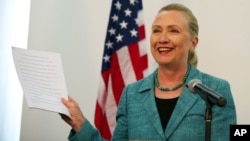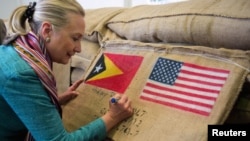U.S. Secretary of State Hillary Clinton has landed in Brunei, becoming the first top U.S. diplomat to visit all 10 members of the Association of Southeast Asian Nations.
Clinton is on a six-nation tour of the Asia-Pacific that has largely focused on urging the ASEAN regional bloc to present a unified front in managing territorial disputes with China.
Brunei is a claimant in the strategic South China Sea, an energy rich area that has become a flashpoint for escalating maritime disputes between China and its neighbors.
Earlier Thursday, Clinton made a brief stop in East Timor, where she said her visit was a "clear, unmistakable sign" that the U.S. will remain a Pacific power.
Following meetings with Timorese officials, she praised Asia's newest country for holding fair elections earlier this year, saying democracy could help it achieve further stability.
East Timor, which gained independence from Indonesia only a decade ago, has struggled to keep up economically with many of its Southeast Asian neighbors.
The country has received a growing amount of Chinese aid and investment, as Beijing seeks to expand its influence in the region. But Clinton again insisted that her visit and increased U.S. involvement is not aimed at curbing Chinese power.
She made similar comments on her previous stop in China, where the two powers tried to find common ground on several issues, including North Korea, Iran, Syria, and territorial disputes in the South China Sea.
No major ground was broken on issues of contention during the two days of talks in Beijing, though Clinton said the visit had helped strengthen the bilateral relationship.
During the talks, Chinese leaders rejected U.S. pressure to agree with ASEAN on a code of conduct for managing the disputes in the South China Sea. Beijing prefers to deal individually with rival claimants, which include Taiwan, the Philippines, Vietnam, and Malaysia.
Following her stop in Brunei, Clinton will head to Russia for a meeting of Asia-Pacific leaders.
Photo Gallery: Clinton's Asia Tour
Clinton is on a six-nation tour of the Asia-Pacific that has largely focused on urging the ASEAN regional bloc to present a unified front in managing territorial disputes with China.
Brunei is a claimant in the strategic South China Sea, an energy rich area that has become a flashpoint for escalating maritime disputes between China and its neighbors.
Earlier Thursday, Clinton made a brief stop in East Timor, where she said her visit was a "clear, unmistakable sign" that the U.S. will remain a Pacific power.
Following meetings with Timorese officials, she praised Asia's newest country for holding fair elections earlier this year, saying democracy could help it achieve further stability.
East Timor, which gained independence from Indonesia only a decade ago, has struggled to keep up economically with many of its Southeast Asian neighbors.
The country has received a growing amount of Chinese aid and investment, as Beijing seeks to expand its influence in the region. But Clinton again insisted that her visit and increased U.S. involvement is not aimed at curbing Chinese power.
She made similar comments on her previous stop in China, where the two powers tried to find common ground on several issues, including North Korea, Iran, Syria, and territorial disputes in the South China Sea.
No major ground was broken on issues of contention during the two days of talks in Beijing, though Clinton said the visit had helped strengthen the bilateral relationship.
During the talks, Chinese leaders rejected U.S. pressure to agree with ASEAN on a code of conduct for managing the disputes in the South China Sea. Beijing prefers to deal individually with rival claimants, which include Taiwan, the Philippines, Vietnam, and Malaysia.
Following her stop in Brunei, Clinton will head to Russia for a meeting of Asia-Pacific leaders.
Photo Gallery: Clinton's Asia Tour







